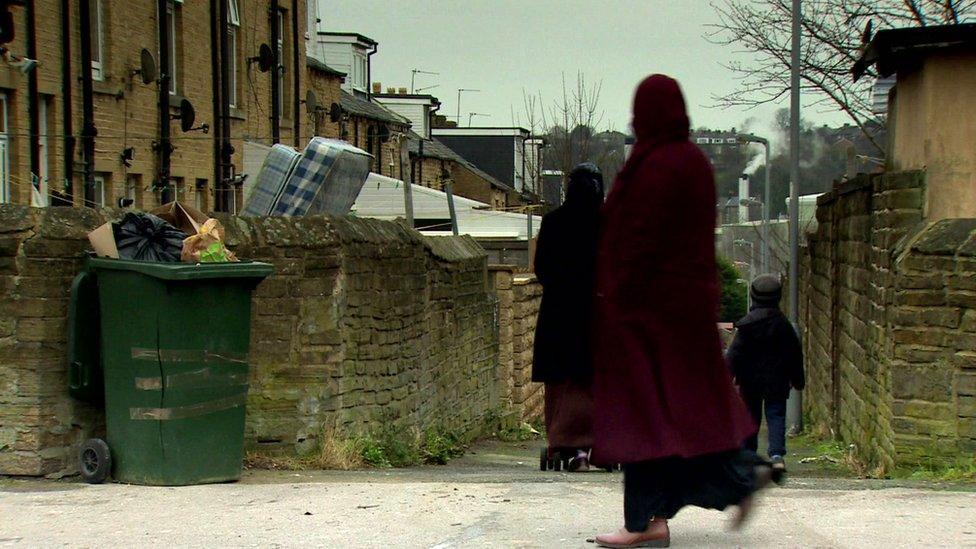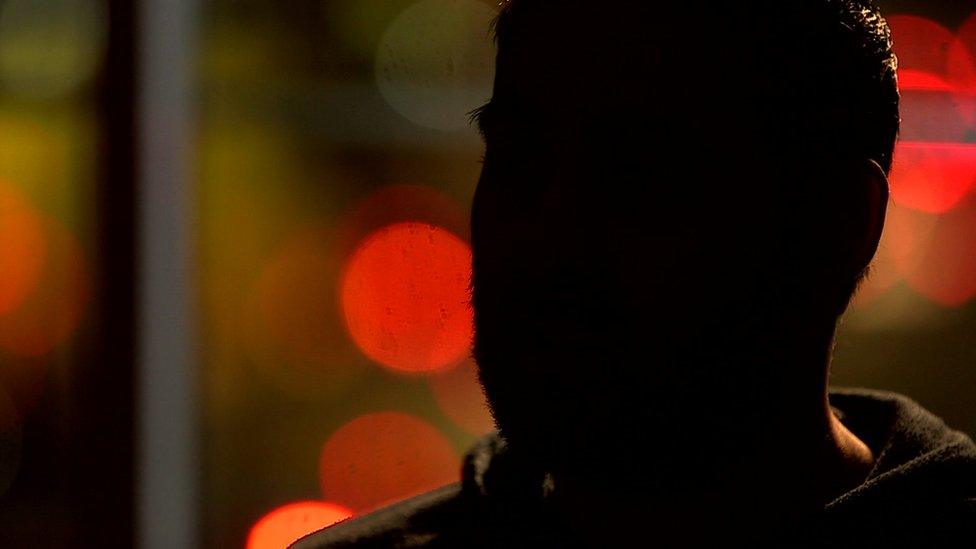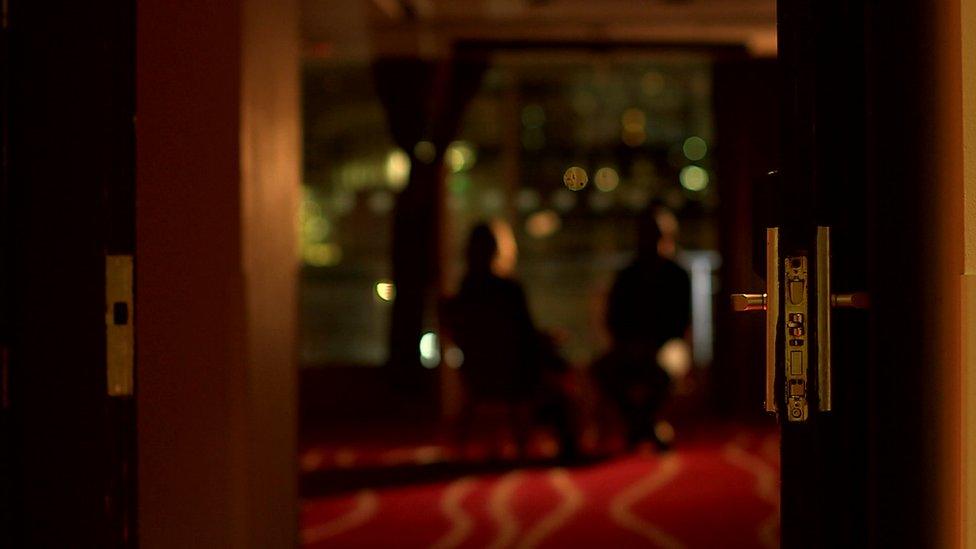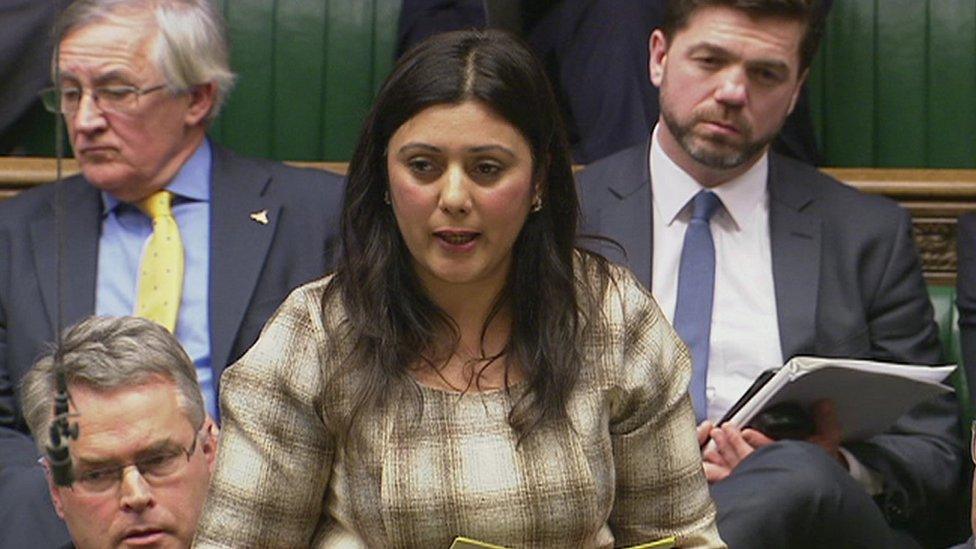Charities sound the alarm on male 'honour abuse'
- Published
"We are trained from a young age to keep the family honour intact" - an imam tells his story
Charities are sounding the alarm over what they say is the underreported issue of male "honour" abuse victims.
Honour abuse is usually associated with women from Muslim, Sikh or Hindu backgrounds and happens when they are seen to have "shamed" their community.
One charity, Jeena, said that one in five cases it handles involves men.
Another, Karma Nirvana, says calls from men to its helpline are up - and this is "just the tip of the iceberg" as many are afraid to come forward.
"We have seen a rise in male victims coming forward in the last year from none to one-in-five victims. It is extremely important to create safe spaces for men to be heard and to believed," Jenna told BBC Newsnight.
The programme has been in contact with about 70 men who say they have suffered various abuses - including domestic violence, sexual abuse and forced marriage - as well as threats against them due to their sexuality.
Most of the victims said they haven't spoken to any authorities about their experiences and believe they have nowhere to turn. Many said they had considered suicide.

Honour abuse is normally associated with women
"Being abused you associate with women in the Asian community. You don't associate it with men," said one victim who spoke to Newsnight on condition he remained anonymous.
"If you associate it with men, it's like: 'She's wearing the trousers. You're weak. We don't like weak people. You need to man up'"
The charity Karma Nirvana says the number of calls from men to their helpline has risen.
"We have seen an increase in reporting of male victims of honour-based abuse. We know the issue is still underreported by men. We are aware males are still not speaking out due to the stigma to coming out or speaking up.
"This is just the tip of the iceberg... we know there are many more male victims that exist."
They believe some of the increase is down to the introduction of a law in mid-2014 making forced marriage illegal in the UK, which raised awareness of the issue among both women and men.
BBC Newsnight contacted 10 police forces across the UK in areas with the highest proportion of black and minority ethnic inhabitants to obtain figures on reporting of male honour violence and abuse.
Four police forces - Metropolitan, West Midlands, West Yorkshire and Greater Manchester police - responded to the request. Between them they had 271 cases of reported male honour abuse between 2010 and 2017. The majority were in London and the West Midlands.
But many men are still uncomfortable coming forward.

Most men asked to remain anonymous due to the sensitivity of the subject
Research by BBC Newsnight showed that men from conservative communities were particularly reluctant to go to the police. The men saw honour abuse as something that only women could report and receive support for.
One man told Newsnight that when he reported domestic abuse by his wife to the police, he was treated as the perpetrator, which left him feeling more isolated and discouraged him from talking to anyone else.
The concept of honour is a cultural rather than a religious tradition and crosses conservative communities - be they Hindu, Muslim or Sikh.
"We are trained from a young age to keep the family honour intact, even if it means you might have experienced abuse, or you might have witnessed abuse in your own family," one victim told BBC Newsnight.
The man, who spoke on condition of anonymity due to the sensitivity of the subject, is now an imam.

Newsnight has been in contact with around 70 male victims of honour abuse
He told BBC Newsnight he was sexually abused by a male relative when he was a boy. Perhaps most shockingly, the relative went on to become an imam himself.
When he finally told his family about the sexual abuse - decades later - he said they were shocked, but didn't want to take it further: "The reason is honour, shame, to the family, to the perpetrator."
When rumours got out he had been sexually abused, his business suffered as close knit community stopped using the services, and he was seen as bringing shame for raising such a taboo subject.
He said family members believed him possessed by an evil spirit, or jinn.
This idea was a common theme in many of the interviews conducted by Newsnight. Victims said when the consequences of their abuse, and keeping silent about it, led to mental health problems, some family members and their wider community believed they were cursed.
'I feared for my life'
Some male honour abuse cases involve men who are gay.
"People I knew were marrying women even though they were gay - or they were killing themselves," says Manjinder who was terrified of telling his Sikh family he was gay.
"I feared for my life. I felt I could be killed… I would be disowned, kicked out of the house and forced to marry a woman, definitely."
Manjinder said he had been threatened with a "beating"
When he came out to friends, the news spread to some of the wider Sikh community and this caused a lot of tension.
He was told he was bringing disgrace to his culture and his whole family - and that it could affect his sister's marriage prospects.
Manjinder was further threatened by the humiliation of being violated by a Black and Decker drill.
Some victims told Newsnight they were urged to stay silent about the abuse they suffered for fear of it casting a dark shadow over their religion.
"The Muslim community, rightly or wrongly, feels that the Muslim community is in the dock at the moment," says the imam who was sexually abused by a relative as a child.
"[They feel] everybody everywhere, from every corner, is scrutinising the Muslims for whatever they do - from what they wear, what they eat, what they do, how they behave."
But, he says, this cannot be used as an excuse for silence.
He says he only felt able to talk about what happened when his work as an imam put him in touch with other survivors of sexual abuse.
"Up until that point, I thought I was probably the only person who had experienced such a thing.
"After listening to at least 30/40 case studies of young Muslim males and some females in this country who have also experienced abuses of a sexual nature - and some by clergy - I felt I had to do something about it, otherwise I would be answerable to God."
Watch Katie Razzall's full report for BBC Newsnight here, external
If you need support with forced marriage or honour violence, help and support is available at BBC Action Line
- Published31 January 2017
